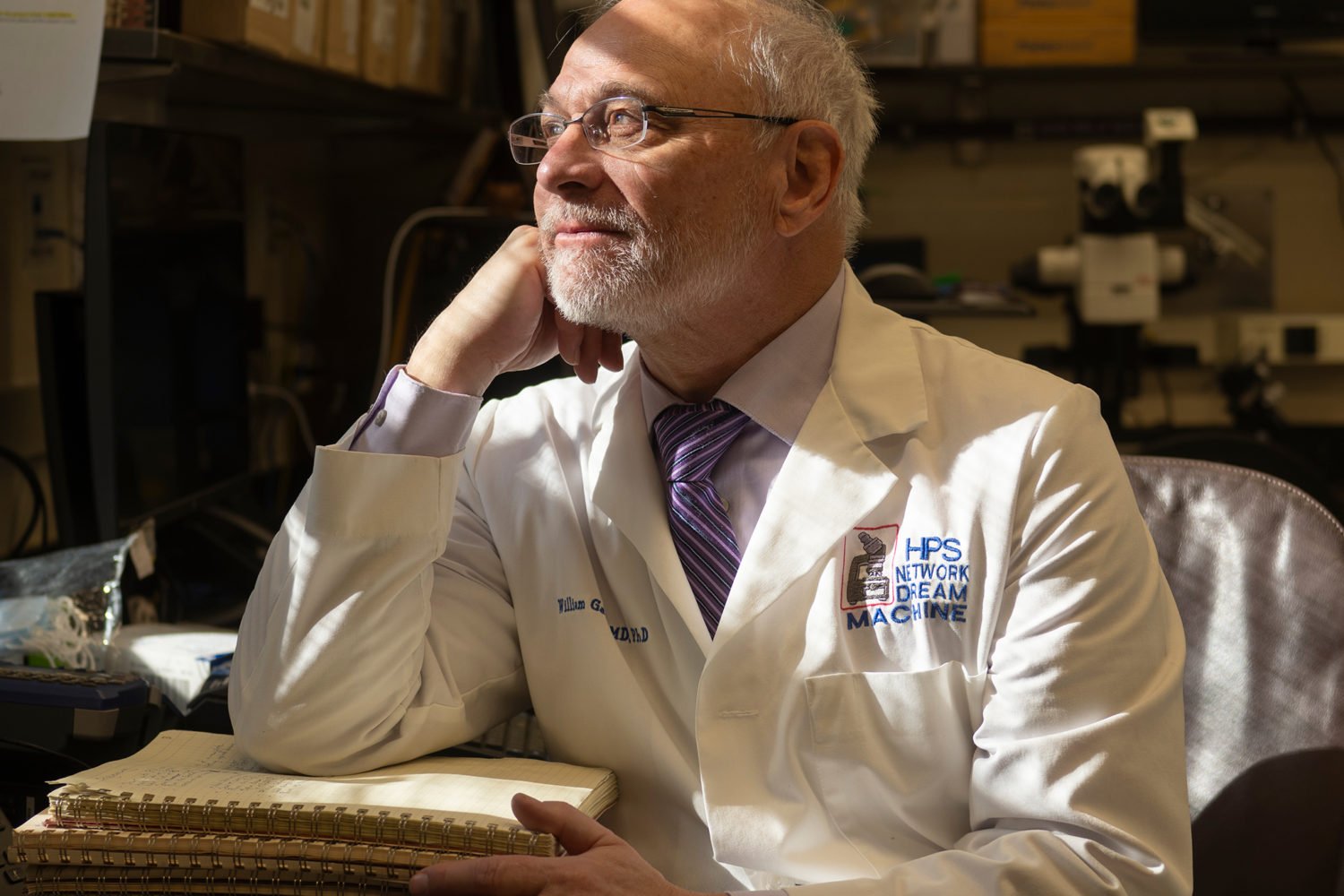On a Thursday afternoon 14 months ago, Arlen Specter mounted the green-carpeted stage of the TV studio just across the hallway from the Senate chamber. Kneading his knuckles, he joined a phalanx of fellow Republicans to face reporters and a bank of cameras. After 25 years in the US Senate, this icon of controversy–the Republican who bashed Robert Bork; the investigator who propounded the single-bullet theory of JFK's assasination–was about to assume the chairmanship of the Senate Judiciary Committee, gatekeeper to the federal court system. Some observers were surprised to see him there. Although his ascension should have been guaranteed by his seniority, it had been anything but assured.
Known by some as "Snarlin' Arlen," he has long been an oddity in the Grand Old Party. His support of abortion rights and moderate views on other issues has rankled fellow Republicans. Last summer the conservative magazine National Review called him the "worst Republican senator." Specter eschews ideological labels: "I believe labels are like bikinis," he once told me. "They conceal more than they reveal."
His most recent sin in the eyes of the GOP faithful came the day after he squeaked to victory over a more conservative candidate in his 2004 Senate primary in Pennsylvania. Despite the support of President Bush and other Republican leaders who helped him to his 51-49 primary victory, Specter said bluntly that any nominee to the Supreme Court opposed to abortion rights would have a hard time getting confirmed by the Senate. He seemed to be saying that such a nominee would not get past the Judiciary Committee chair–the post he was to assume.
Antiabortion activists demanded that Specter be denied the chairmanship. For decades they had waited to reshape the Supreme Court, and the chance to do so had arrived. They weren't going to allow Arlen Specter to ruin their plans.
Conservatives lobbied Senate Republican leaders to pass over Specter and pick another senior member of the committee. Working quietly behind the scenes was Pennsylvania's junior senator, Rick Santorum, a GOP leader whose conservative credentials are beyond reproach. With Santorum's help, Specter agreed to read a statement in which he promised to give Bush's nominees "quick committee hearings and early committee votes."
Finally, in the bright lights on that stage in November 2004, Specter pledged that he would do just that. "I have no reason to believe that I'll be unable to support any individual President Bush finds worthy of nomination," he said. "I believe I can help the President get his nominees approved." The tough old gangbuster from Philadelphia had landed on his feet once again.
Specter had faced more than his share of adversaries. He'd beaten Teamsters in court, sent corrupt city politicos to jail, sunk and saved Supreme Court nominees.
While he was an assistant district attorney in Philadelphia, he was tapped to help in the Warren Commission's investigation into the assassination of President Kennedy. His most famous–some would say infamous–contribution was drafting the conclusion that it was a single bullet from Lee Harvey Oswald's Mannlicher-Carcano that struck Kennedy in the back of the neck, exited his throat, penetrated Texas governor John Connally's chest, wrist, and thigh, and wound up–largely unmarred–on a stretcher at Dallas's Parkland Memorial Hospital.
And those challenges were just in his public life. Privately, he has survived two operations on a brain tumor–in 1993 and 1996–and a double-bypass surgery in 1998.
When the press conference broke up, Specter paused to answer a few final questions. Asked how the fight he'd just survived compared to his many past battles, he thought a moment and replied without smiling, "This was the toughest." What he didn't know as he stood there savoring his victory was that a fiercer battle lay before him.
In the weeks after that press conference, Specter began feeling tired. He visited doctors, who performed tests but could find nothing wrong. In January of last year, he and his wife, Joan, went to Florida in hopes that a change of pace would help. "I was very tired," Specter, 75, says of that trip. "I spent my time in bed."
He skipped President Bush's State of the Union address in February to rest.
"Finally, one of my blood tests showed a little irregularity," he says. Doctors at the University of Pennsylvania's Abramson Cancer Center did more tests and performed a biopsy on his lymph nodes. On February 16–a little over a month after assuming the chairmanship of the Judiciary Committee–Specter announced he was diagnosed with Hodgkin's disease–Stage IV B, an advanced stage.
Though a relatively curable cancer, the disease requires a punishing regimen of chemotherapy that often leaves patients in such pain and so drained that they wonder whether the disease or treatment is worse.
Specter analyzed the situation as if it were a court case. He cross-examined doctors. He decided on a course of action.
"I'm very particular," he said when asked if he was as tough with his doctors as he can be with witnesses before his committees. "I like exact answers, and I do push doctors. I don't believe you can rely on doctors–I think you have to check things out yourself."
His first order of business was to alert his constituents to his ailment. The press release he dispatched within hours of his diagnosis was almost clinical.
"Senator Specter had experienced persistent fevers and enlarged lymph nodes under his left arm and above his left clavicle," the statement said. "He received testing on February 14th at Thomas Jefferson University Hospital. The testing involved biopsy of a lymph node and biopsy of bone marrow. The lymph node was positive for Hodgkin's disease. The bone marrow biopsy showed no cancer."
Near the end of the release, Specter wrote: "I have beaten a brain tumor, bypass heart surgery and many tough political opponents; and I'm going to beat this too." While he was battling the cancer, he vowed, he would "perform all duties of his office including those related to the chairmanship of the Judiciary Committee."
This was no small goal. From tort reform to renewing the Patriot Act to considering the President's judicial nominees, the issues at the top of the Senate agenda would originate in the committee Specter now chaired. Any one of those matters could tie up the Senate for months.
All the while Specter would be returning every other Friday to Philadelphia, where doctors would inject a chemical cocktail through a metal "port" attached to Specter's chest. "They stick big needles into the port and a little tube that drains down into my something-or-other," said Specter. "I'm not very good on plumbing or mechanics, so I couldn't really tell you much more than that." The regimen would go on for eight months.
Specter's first chemotherapy treatment came two days after he was diagnosed with Hodgkin's. He had dealt with pain before, but he'd never encountered anything like the constant "overhang of fatigue" brought on by the chemotherapy.
"Once you get started on chemotherapy, you don't know what the hell is Hodgkin's and what is chemotherapy," he says. The chemo caused clean water to taste undrinkable and toothpaste to burn his mouth. So he got a special toothpaste and carried Gatorade everywhere he went. The treatment also caused his eyes to water and his sinuses to run, requiring Specter to punctuate his sentences with hard sniffs and dab at his eyes with tissues. Worst was the fatigue.
"I countered it by going to bed early and taking a lot of naps," says Specter. "There were some days when I took three naps. On Monday morning, I would be driven to Washington–picked up at seven o'clock, arrive about 10 o'clock, go straight to my hideaway, and I'd go to sleep. I'd slept all the way here."
Specter's "hideaway" office in the Capitol is a high-ceilinged space cluttered with pictures. On his desk is a football signed by Virginia senator George Allen. It was Allen, whose father was the famous Redskins coach, who "quarterbacked" the campaign victories of Specter and other Senate Republicans in 2004. A big window looks out over the East Front of the Capitol; construction has rendered the view desolate for more than a year now.
One day in early spring, I ran into Specter walking alone in the hallway outside his office. He was gaunt; his suit hung loosely. He was pale, his eyes watery and red. And he was nearly bald, though he combed his remaining strands of hair into a ghost of his old hairstyle. I'd watched his transformation on a nearly daily basis over the months but was startled that day by the cumulative ravages of the disease and its treatment. I asked how he felt. Not of the Oprah generation, Specter growled: "The only time I'm not in pain is when I'm asleep or playing squash."
Throughout treatment, Specter maintained his schedule as closely as he could, including his daily squash match.
"When he was first diagnosed with cancer, I thought it would have some impact on his regimen," says lobbyist Tom Worrall, 36, a regular squash partner. "It didn't at all. Really, it was humbling."
Besides sleep and squash, Specter says, one other thing eased his pain: work. He spent hundreds of hours during the lowest points of his sickness crafting a bill to create a $140-billion fund to settle thousands of lawsuits stemming from exposure to asbestos. He helped negotiate the confirmation of all but two of Bush's filibustered judicial nominees and ran the confirmation hearings of Chief Justice John G. Roberts Jr.
"I found it a great diversion," he says of the work. "That would be a third time I wasn't in pain."
Specter's work pace may have eased his pain, but it didn't make life easier for others. Specter began starting Judiciary Committee hearings precisely at 9:30. When a television producer complained that the schedule meant that hearings began before cameras and reporters could get into place, Specter agreed to convene the meetings one minute later.
The pace took its toll on staffers. "Don't get me wrong, I absolutely adore working for the senator," says the committee's general counsel, Carolyn Short. "He's really the best. He's very demanding. He would be intolerable if he was so demanding and he didn't expect the same of himself. He is the hardest-working guy I've ever met."
Senator Patrick Leahy, who has known Specter for 30 years and works with him on the Judiciary Committee, says the man never slowed down. "It's nothing short of remarkable," says the Vermont Democrat. "The more things were going on and the more important those things were, the better off Arlen was."
The ordeal did not dull Specter's wit–or sweeten his style. In June, after he'd surrendered to baldness, Specter spoke to reporters about identity theft. "I found out there was another kind of identity theft," he said with no hint of a smile. "They stole my identity, and I looked in the mirror and couldn't figure out who I was."
In May he appeared on ABC's This Week with Kansas senator Sam Brownback to talk about embryonic-stem-cell research, which Specter supports and Brownback opposes on moral grounds. Their exchanges were heated and became personal as Specter said that stem-cell research could help find a cure for Hodgkin's disease. During one exchange, Brownback asked Specter when his life began, hoping to emphasize that embryos are living. "Well, Sam," Specter said, "I'm a lot more concerned at this point about when my life is going to end."
On the Monday morning after Thanksgiving, I ride up to see Specter in Pennsylvania. It has been four months since his last injection of chemotherapy. We meet at a television studio in Harrisburg, where he is in a live discussion with reporters. When he walks into the green room, he looks nothing like the cancer patient he's been for most of the year. He fills out his suit, and his hair has returned. It's shorter, giving him a more modern look.
He's been at it since 6 AM, holding press conferences across the state and stepping into controversies, such as the dispute between the Philadelphia Eagles and star receiver Terrell Owens. During the television show, the host asks Specter about his health. He replies dryly that he's spent his whole life in pursuit of such lofty aims as truth and justice, and in the end, all he'll be remembered for is growing his hair back.
On the two-hour ride back to Washington in the back of a Lincoln Town Car, it is clear that Specter no longer requires naps in the car. And that he has not mellowed.
"Will you not work, Scott, please?" Specter tells Scott Hoeflich, his diligent press secretary, who is filling in as a driver and has glanced down at his BlackBerry. Later, in the middle of a tale about a 50-minute meeting with President Nixon in the Oval Office, Specter interrupts to give more driving advice. "Scott, you're really weaving in and out," he says. "Let's be sure we get there safely." A few minutes later, he pauses again. "Oh, Scott, I like to stay one car length back for every ten miles per hour, which puts you six-and-a-quarter car lengths back." To each admonishment, Hoeflich replies with a "Yes, senator."
When the conversation turns to his cancer, Specter is matter-of-fact. His wife, he says, was "crestfallen" by the initial diagnosis, but he addressed it dispassionately. "My thought was to question it," he says. "What are the consequences? What is the mortality rate? Is it curable?" In the grand scheme of things, he says, it wasn't the worst news he'd ever gotten. "I was given three to six weeks to live once," he says, as he looks out the window at the Pennsylvania farmland. "I was code blue on my bypass surgery."
The senator was told his likelihood of survival was 70 percent over five years. On hearing that, Specter says, one of his granddaughters asked him, "What is this 70-percent business?" The senator explained it. Then, he says, "My seven-year-old granddaughter told me she was going to become a nurse. Take care of her grandfather."
Specter says he never fretted over the statistics. "My mindset was that I was going to beat it, and let's just get on with it. . . . It was easier to get out of bed, go to work, than it was to stay in bed and feel sorry for myself."
Specter's father immigrated to New York from Ukraine in the early 1900s. Specter remembers selling cantaloupes door to door as a child with his father; later he worked in the junkyard his father opened in Russell, Kansas, cutting up iron with an acetylene torch.
In his autobiography, Passion for Truth, Specter writes about the Bonus Army, World War I veterans who marched on Washington in 1932 to demand a $500 bonus they'd been promised by Congress. Harry Specter, who had served as an infantryman in the war, couldn't afford to travel to Washington. When his brothers in arms set up camp along Pennsylvania Avenue, President Hoover dispatched the cavalry to run the old soldiers off. "In a figurative sense," Specter writes, "I have been on my way to Washington ever since to collect my father's bonus–to push government to treat its citizens, the millions of hardworking Harry Specters, justly."
Specter carries that aura on the ride back to Washington–back to work. When I press him–had he never feared losing his battle against cancer?–he laughs. "Well, I never doubted I would beat it," he says.
He calls for corroboration from the staffers in the front seat. "Carolyn, Scott–testify!" he demands.
"It just about killed us," replies Carolyn Short. Throughout the chemotherapy treatment, she says, Specter would have his staff to his condo in Georgetown to work late into the evening. "Everytime we got out of hearings–twice a week while he was taking chemo–he would have Judiciary Committee dinners at his house until 11 o'clock at night, and we were all exhausted." And early the next morning, Hoeflich adds, Specter would be up for his game of squash.
"I'm a martini drinker," Specter explains. "The worst that would happen is I'd have two martinis and go to bed."
Charles Hurt is a national political reporter for the Washington Times. His profile of John Edwards ran in the May 2003 Washingtonian. He lives on Capitol Hill with his wife and two children.

















